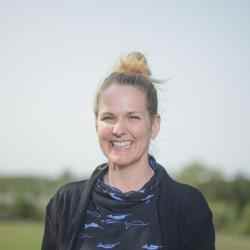Introduction
Within the context of the climate crisis that we are experiencing, bringing to light the disconnect between humans, animals and the environment, Kai Pacha is proposing a new way to reconnect which includes all people as key components in the creation of a new environmental balance where humans are recognized as part of nature.
The New Idea
Kai argues that the right that humans claim to take advantage of nature, as if we own it, is the basis of an abusive culture. In order to change this, she promotes the development of a new decision-making architecture working with key players, promoting the incorporation of new perspectives and the development of concrete strategies, to create a more sustainable and fair coexistence. Kai founded Pumakawa, the organization located in a Natural Reserve she owns, that is promoting a new relationship between people, animals, and the environment which recognizes the importance of each species and their interdependence for the planet’s balance.
Throughout the years, Kai developed a deep relationship with pumas and their environment and choose them as the face of her organization, giving them the role of sentinels for environmental balance, similar to the role of canaries in coal mines which were introduced by English miners at the end of the 19th century. Using this approach, Pumakawa develops educational, communicative, and strategic processes which integrate a wide range of participants: agricultural producers, governmental entities, social organizations, conservationists, entrepreneurs, schools, and the general public. These actors transition from being on opposite sides (in some cases even killing pumas) to collaborate and care for the preservation of pumas and environmental balance. Caring for the puma and restoring its habitat are the starting points of a comprehensive environmental conservation strategy that calls for multiple stakeholders. Kai began her work in the Cordoba’s mountain where her Reserve is expanded and developed a “network of pumologists” from all over the country with whom she is extending the work in other regions. The experience and trajectory of Kai has transcended her Reserve in the Province of Córdoba and she now works with organizations and entities from all over the country.
The Problem
Wildlife and native woodlands are often the victims of abusive human activity. Pumas, as well as other species of predators, are being exterminated by hunting or by farmers watching over their livestock and are also threatened by deforestation or by people wanting exotic pets. This leads to a serious impact on the environmental balance, since the pumas cannot carry out their important natural duty of controlling the species that they eat. As a consequence, these species grow to an unmeasurable number, generating an impact for the rest of the nature that surrounds them.
Pumas are considered a plague because they hurt livestock in the countryside, but this is no more than a symptom of other issues such as deforestation, habitat fragmentation, intensive cultivation, and lack of livestock management. In 1907, an order was enacted by the Agricultural Ministry, which is still valid today, which declared the vizcacha as a national infestation, and exterminated it, leaving the puma without its main natural food supply. Pumas have then turned to human sources of food such as livestock. Agricultural producers do not practice adequate management techniques with pumas due to lack of knowledge and not having the resources for it. On the other hand, when they demand intervention from the environmental police to control the pumas they get no answer, since government agents face the same problems of scarce knowledge and resources. Aside from that, they do not have adequate enclosures to keep specimens.
There is disinterest throughout the government towards the issue, so environmental officers do not prioritize it before other demands that they consider more pressing, without calibrating the importance of pumas for the ecosystem’s balance. There are no adequate incentives for public policies to contribute to the assessment and preservation of the environment. Thus, in the absence of clear policies, pumas are either hunted or bred as pets. In Chubut province, for example, the puma has been declared as a harmful species by the government. Economic incentives are offered for hunters who collect the animals’ skins, and a government program has been put together to train people on how to kill pumas. In the province of La Pampa, there are four authorized puma breeders for the purpose of hunting, which are used as a way to justify trafficking these animals as hunting trophies. Argentina holds the seventh position in the world in the trafficking of hunting trophies. Additionally, Kai estimates that in the province of Córdoba alone, there are close to 90 pumas held captive as pets.
These are only some of the aspects of a paradigm that prioritizes humans in the center and puts animals and the environment second, neglecting the interdependence and fundamental needs of each species.
The Strategy
Kai, through Pumakawa, is looking to transform the current nature abuse culture into a culture in which humans recognize themselves in interdependence with all species and the environment. Throughout her life, Kai has developed a deep bond with pumas and their environment, which constitutes a key aspect of Pumakawa’s approach, a name which means “The one who cares with the stealth of a puma.” For Kai, pumas carry out the essential function of the sentinel animal. In other words, when the pumas attack sheep, they show that their natural ecosystem has been overwhelmed and they have moved to new territories due to the advancement of desertification, the advance of agriculture in increasingly extensive lands, and the absence of the animals that make up their natural sustenance.
To reestablish the balance and preserve pumas, Kai is developing a series of strategies based on knowledge from, and education and dialogue with all of the stakeholders related to the issue, creating a new architecture for decision management. Among her main stakeholders, agricultural producers stand out, as they are often affected by the predation of their livestock. Far from opposing them, Kai dove into the deep end of the issue and became associated with the Chamber of Sheep Producers of Córdoba (CAPOC) in order to gain perspective on the diagnosis of the issue and work side-by-side in creating effective strategies. The empathy she developed with producers led her to the creation of Cacu Project, through which Kai and 150 sheep producers from the Chamber designed an action plan to diminish the puma attacks without having to kill them. In this way, producers get access to new knowledge and tools and have their unattended needs heard in a recurring matter by competent authorities. The plan includes the restitution of the vizcacha, which is a puma’s preferred food, and will be extracted from fields where they are considered a plague and introduced into the forest where pumas are killing the livestock. In 2022, they began with a pilot plan of eight viscacha translocations, with which they will test the strategy that can be replicated in other territories starting next year.
Kai has also supported the Chamber in the creation of a mule breeder project with her assessment, which will be provided to their producers to protect the livestock during the herding. They started the implementation with 15 livestock producers and there are another 25 waiting for donkeys to be implemented in their fields. Kai also designed an intermittent light kit which is more efficient and cheaper than the ones available on the market and helps drive the pumas away. She got support from the Brigitte Bardot Foundation for 50 kits that are being tested with small and medium producers. These measures constitute a new practice for producers who are starting to implement them and that will be replicable in other regions of the country. Kai has invited two large producers associated with the Chamber as ambassadors of the strategy for other regions and after two years of documentation, Kai plans to transform Cacu Project into a public policy.
Working with the government represents a great challenge for Pumakawa. In general, governments do not consider environment and wildlife protection a priority; in several of the country’s provinces the governors and other relevant public figures are the large agricultural producers who see their interests affected by the presence of pumas. In the face of this, Kai has built a one-on-one approach that begins when she is contacted to resolve threatening situations with pumas. While solving the specific situation, Kai works out a new and more holistic perspective of the problem with decision makers and presents the Cacu Project and new protocols she developed for managing pumas and other wild animals. At a national level, Kai is working with the Ministry of Environment, on the creation of a Federal Network of Rescue and Rehabilitation Centers to manage wildlife, which would receive specimens from all over the country found in illegal trafficking operations. Kai and her team also developed a protocol for the handling of pumas and a kit to equip the provinces’ environmental police in order to give them the knowledge and resources that they lack for handling animals. These practices have allowed the rehabilitation of around 100 pumas, and they are monitoring around 800 specimens, successfully resolving conflict situations with pumas. Kai carried out this work with the financial support of the International Humane Society and the Brigitte Bardot Foundation; as the pilot projects exceeded their expectations, they are now supporting her national expansion and making Kai the public face of their efforts.
In order to get attention about the puma and its relevance for nature, along with Alex Macipe, a photographer from National Geographic, Kai has established August 30th as International Puma Day, for the promotion of campaigns and actions for their preservation. At the legislative level, Kai is working on a law project to prohibit trophy hunting. This project is propelled by a public awareness campaign, “Blood Trophies,” that, to date, has already collected almost 65,000 signatures. A key ally of the campaign is the airline Aerolíneas Argentinas, which for the first time ever restricted the transfer of hunting trophies as a result of the campaign. Also, within the framework of the campaign, important legislative changes were achieved, such as the prohibition of the export, import, and transit of hunting trophies of native wildlife species and the prohibition of the registration of breeding farms of native species for hunting purposes. The campaign also led to the recognition of the Minister of the Environment, with whom Kai began a collaborative relationship that will enhance Pumakawa’s efforts at the national level.
Kai argues that you cannot value what you do not know. In order to build a close and empathetic bond with nature, Kai leads knowledge and content creation that is distributed through a various set of channels and the Reserve itself. “Aula Abierta al Sol” (translated as ‘classroom open to the sun’), is an initiative for schools and families that gathers 7,000 annual visitors. Children and adult visitors learn about pumas and all of the flora and fauna in the forests of Córdoba, especially through stories that tell the history of each animal on Pumakawa’s list. During the visits, the “baptism of the Guardians of the forest” is performed where children and adults commit to transformative actions toward caring for the environment and all life forms. The reserve also has a greenhouse with native plants and a seed bank that distributes seeds through the schools that are trained to take care of greenhouses with the support of Córdoba’s Ministry of Production. The seed bank provided the seeds to replant 5000 native trees for forest restoration after wildfires.
Kai also creates content to publicize the species and habitats of the entire country, in different formats that distributes through channels such as La Voz del Interior (the largest press player in the central region), the Environment Agency, the Córdoba Tourism Agency, and the community of 17,000 followers on Instagram and 34,000 followers on Facebook, among others. An example is the collection of Ecoregions of Argentina: 40 nature photographers participated portraying the environments of the country, with updated maps and the main challenges of each region. This collection is sold in the Pumakawa's Reserve store and its contents are also part of the educational workshops with schools. The collection of native plants, together with a packet of seeds, sold 50,000 pieces, and the guide to building home gardens has distributed 15,000 pieces.
In order to expand her work nationally, Kai put together a network of puma specialists “pumólogos” throughout the country made up of 40 experts including scientists, conservationists, and researchers interested in the conservation of the environment as well as pumas. Together with these experts, she has set up three network conventions to monitor the problem in different parts of the country and created a collaborative library to disseminate information and research. Kai also works with the Pumólogos Network in the replication of the Cacu Project. Pumakawa’s work is recognized at a local, national, and international level. Among the most relevant organizations that they work alongside with are the School of Agronomy at the National University of Córdoba, the International Humane Society, the Brigitte Bardot Foundation, and the Environmental Secretary of the Province of Córdoba, News World Safaris, Bioguia, Pumas Chile, and Fundación Cullunche, among others. Kai was recognized by Jane Goodall at #COP21 for her Tapestry of Hope (Tapiz de la Esperanza). In her growing plan and broadening impact, Kai also envisions the creation of a “School of Mountain's Guardians” that systematizes all the knowledge and practices of Pumakawa for training changemakers in their approach.
The Person
When Kai was a child, she experienced difficulties in communicating with people and was diagnosed with autism. She was raised in a rural surrounding which made it easier for her to bond with animals than with people. Her father was a hunter, and her mother was passionate about plants. Kai always had a very obvious sensitivity and consciousness towards the environment and humans’ effect on it. She remembers that when she was a child, she would take walks through the field with her father and would lie down in the wheat and look at the sky; and after she got up, she would straighten the plants that she had flattened. On one of her father’s hunting trips, he saw how some puma cubs were left without a mother: based on that experience, he decided to stop hunting and started a natural reserve which he named El Edén, where Kai began to help out here and there.
Kai was always interested in helping people, which led her to study to become a social worker. And though she felt the urge to connect with people, the exchange and communication proved to be too big a challenge. In 2008, she began working full-time at the Reserve to live more connected to nature. That same year, she traveled to the Amazon rainforest for a month and discovered different Amazon cultures and the relationship that the indigenous communities have with nature. That experience ended up being very enriching for Kai because she found people that had a similar worldview to hers.
In 2009, a forest fire at the reserve forced her to open the enclosures of the pumas that she was in the process of recuperating and, as a complete surprise to her, they followed her and awaited her orders until they were able to return to their enclosures. Kai identifies that moment as a milestone which made it clear that her life’s purpose was to guard the forest and the pumas. It was so significant that she changed her name from Karina Maschio to Kai Pacha, which means “puma protector here and now,” in the civil registry of the province of Córdoba, setting the precedent as the first person to change their name in honor of their life’s mission. That same year she reestablished the Reserve previously known as “El Edén” as Pumakawa. It then changed from a traditional family tourism spot in nature to a conservation and action center for environmental care and wildlife protection.
Now that Kai has proven the effectiveness of the new ecosystem, she has forged in one region among farmers, environmentalists, schools, and NGOs, she is ready to step onto a nationwide stage. Kai is about to become the face of a major campaign against trophy hunting while working with small and large farmers to change agricultural practices and allow the puma population to grow and coexist, restoring nature’s delicate balance between animals, humans, and the environment. Kai’s profile, with her profound sensitivity and empathy and the fact that she is neither a scientist nor a conservationist, gives her a vision and capacity for dialogue that is strong and unique.




